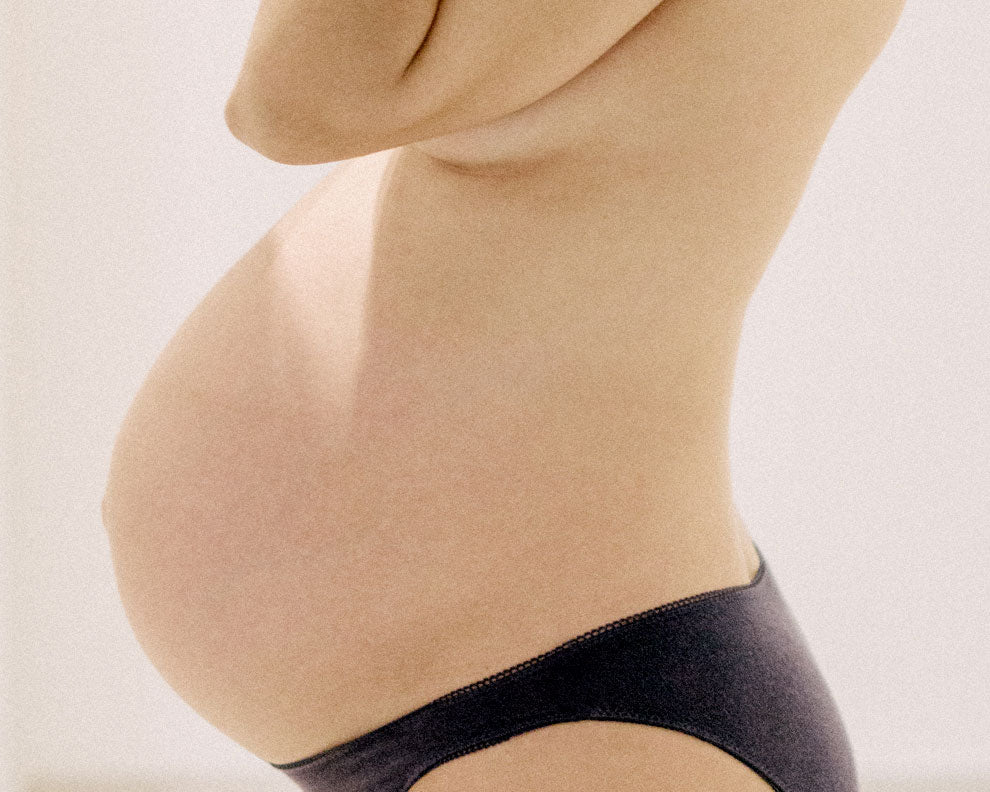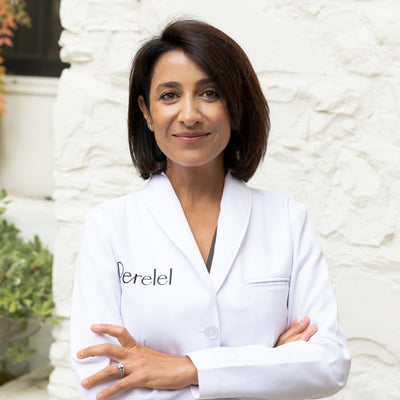Detoxifying your beauty routine takes on a whole new meaning when a baby is on the brain. Suddenly, everything you put on your body goes under a microscope. Is it paraben-free? What about sulfates? If you’re like us—you start Googling every ingredient you can’t pronounce. “So...what is hyaluronic acid anyway?” Whether you realize it or not, you’re decreasing what’s referred to as “your body burden.” A motherhood right of passage as far as we’re concerned.
bod·y bur·den
noun
-
the total amount of a particular chemical present in a human's body
“It’s important to note that many may have ingredients that are known carcinogens endocrine disruptors and can cause birth defects,” explains Perelel Medical Co-Founder Dr. Banafsheh Bayati, MD, OB/GYN, FACOG. “These ingredients can affect not just the unborn baby, but also the health of the child, teen, and adult.”
What’s more, your body burden today can be passed down to future generations tomorrow. “Our body burden during pregnancy not only affects ourselves and our unborn baby but also our grandbabies,” says Bayati. “We now have proof that what we do today affects future generations in ways we never thought of before.”

But first, a little background...
In the U.S., personal care products are manufactured with 10,500 unique chemical ingredients and there is no requirement for safety testing the chemicals that go into personal care products. Instead, the F.D.A. has required the cosmetics and personal care industry to self-police themselves through the Cosmetics Ingredient Review panel. Over its 36 years, the panel has rejected only 11 ingredients as unsafe in cosmetics—a stark contrast to the hundreds that have been banned in the European Union.1
Pause and remember to trust your body.
When you start looking under the hood of your beauty cabinet, it all can feel overwhelming. But trust—your body is your best detoxification system. “Our bodies are made to protect us and to detoxify harmful substances,” says Bayati. “So it’s best not to be overly anxious but rather to focus on keeping our bodies healthy so that the systems in place to protect us, such as our skin, immune system, intestines, liver, and kidneys, can continue to do just that.”
“Our bodies are made to protect us and to detoxify harmful substances."
And not all chemicals are created equal, either. A little science lesson—fat-soluble substances are the ones that stay in your body longer than their water-soluble counterparts. “An important aspect of chemical exposure is whether the substance is water or fat-soluble,” says Bayati. “Water-soluble compounds are easily excreted whereas fat-soluble chemicals are stored in fat and not easily removed from the body.” Additionally, various chemicals will differ in their “half-life.” A chemical’s half-life is the time required to reduce the concentration of the chemical in the body by 50 percent.
half life
noun
-
the time required to reduce the concentration of the chemical in the body by 50 percent
Dr. Bayati breaks it down. “Repeated exposure to a chemical, especially one with a longer half-life, can result in cumulative storage and what we call a higher body burden. It’s best to consider making changes well before conception given the half-life of many compounds,” she explains, adding that factors such as age, genetics, or lifestyle choices like tobacco use also play a role.
So where do you start when it comes to unloading your body burden? We’re here to help.
“The best way to reduce body burden is to first be aware of toxins, and second, to lead a healthy lifestyle with regular physical activity and exercise (sweating is particularly helpful), healthy nutrition, and stress reduction with mind-body practices.”
-
Check ingredient labels.
Simplify your routine with fewer, safer products and check labels using the Environmental Working Group’s database.
“It rates the safety of many products as well as published research on why an ingredient is safe or not. It’s an excellent resource.”
We wanted to make it a little bit easier for you to check your product labels at Perelel, too. Our handy Pregnancy Label Check tool, flags which personal care or beauty products contain ingredients that may not be recommended when trying to conceive, pregnant or breastfeeding.
-
Pregnant or breastfeeding? Skip these products.
There’s no better time to find some new (& clean!) beauty goodies.
“There are a few products and prescriptions that pregnant patients should avoid that we know can cause birth defects. These include retinoids, which are found in Retin-A and Accutane,” says Bayati. This also includes any retinoid and vitamin A derivatives like retinoic acid, retinyl palmitate, retinol, tretinoin, isotretinoin and tazarotene, salicylic acid, benzoyl peroxide, hydroquinone, and prescription acne medications. The same goes for any professional treatments such as chemical peels, laser treatments, Botox and similar agents such as Dysport or Xeomin."
Use our Pregnancy Label Check tool to find out if your products are clean + pregnancy-safe.
-
TTC? You may want to consider decreasing your body burden, too.
Plus, decreasing toxin exposure may help increase fertility for both you and your partner.
“Our concern for the developing baby should start well before conception, preferably three to six months before conception.”
-
Limit toxin exposure for new babies.
It’s time to be mindful of the chemicals in your home, personal care and baby care products.
“A newborn’s gut and skin are colonized by whatever microbes the infant comes into contact with and ideally this is best done with the mother’s own gut and skin flora,” says Bayati. “It’s not only important to think about what you are placing on your body but also what you are taking into your body.”
Check Your Products to See If They Are Clean & Pregnancy-Safe
To help take the guesswork out of your switch to clean products, our team of doctors and resident toxicologist have identified the Unclean 15—a list of potentially toxic, unsafe ingredients to avoid during pregnancy, while breastfeeding, and when you’re trying to conceive. So you can make empowered, informed decisions about your health.

Use our Pregnancy Label Check tool to find out if your products are clean + pregnancy-safe. Plus, learn more about the Unclean 15 now.
Read more non-toxic living tips from Geri Hirsch in her series Intentional now. Ready to swap your beauty cabinet? Check your products to see if they're safe for pregnancy now.
1Skin Deep® Cosmetics Database | EWG." https://www.ewg.org/skindeep/contents/why-skin-deep/.
This article is for informational purposes only. It is not, nor is it intended to be, a substitute for professional medical advice, diagnosis, or treatment and we recommend that you always consult with your healthcare provider. To the extent that this article features the advice of physicians or medical practitioners, the views expressed are the views of the cited expert and do not necessarily represent the views of Perelel.




















